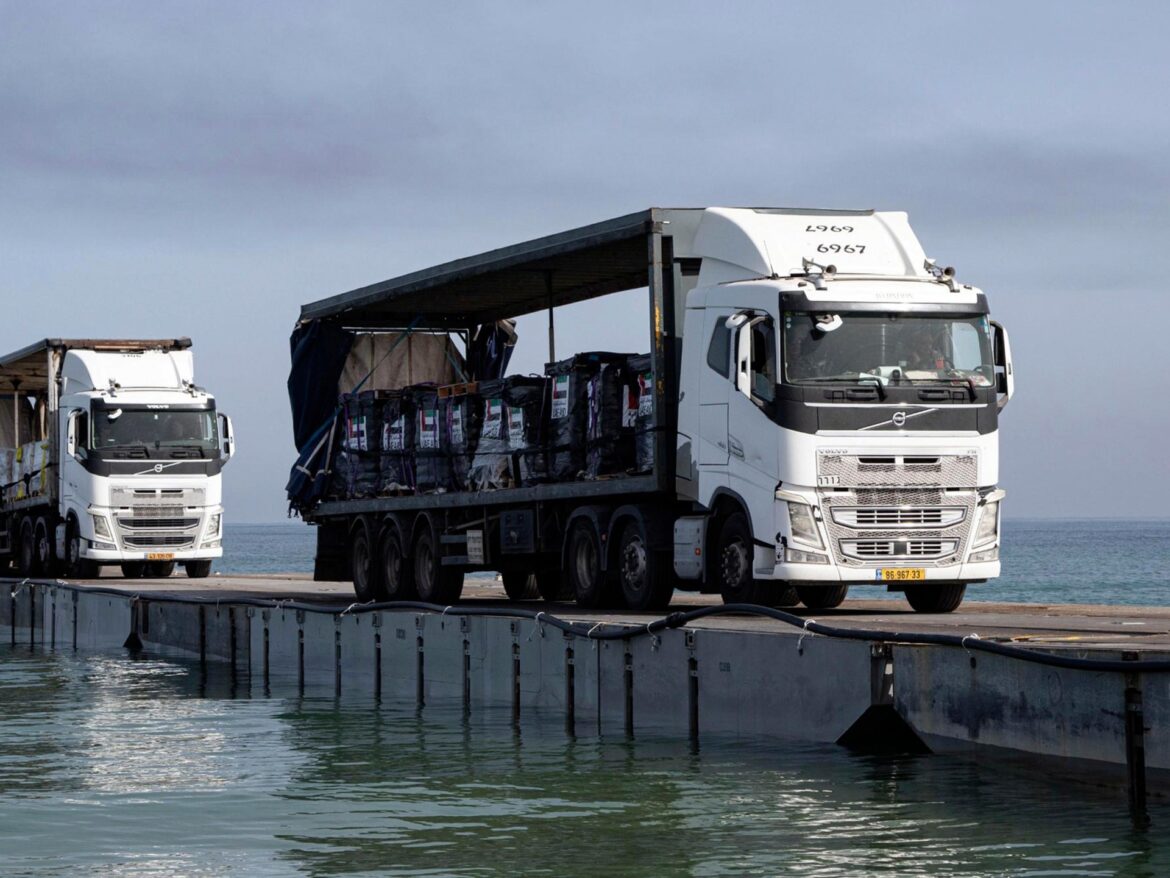The US Department of Defense said a pier recently installed to carry aid deliveries into the Gaza Strip would be temporarily removed for repairs, after a section of the span was damaged by bad weather.
Pentagon spokeswoman Sabrina Singh said Tuesday afternoon that deliveries of humanitarian aid by sea to the Palestinian coastal enclave would be suspended while repairs were underway at the so-called “Trident” pier.
A section of the jetty installed by the United States broke away earlier in the day due to high seas and the North African weather system, Singh said.
“The reconstruction and repair of the pier will take at least more than a week and, once completed, it will have to be re-anchored on the coast of Gaza,” she told reporters at a press briefing.
“So, once the repair and reassembly of the pier is completed, the intention is to re-anchor the temporary pier to the Gaza coast and resume humanitarian aid to those most in need. »
The announcement comes as 20 humanitarian groups warned that even with the jetty, aid deliveries to and within Gaza remain woefully insufficient as Israel’s bombing and siege on the territory approaches its eighth month .
Israeli military attacks have killed more than 36,000 Palestinians in Gaza since the beginning of October.
The Israeli siege of the enclave has led to shortages of food, water, fuel, medicine and other supplies, and prompted United Nations officials to warn that famine is setting in.
On Tuesday, humanitarian organizations – including Amnesty International, the Norwegian Refugee Council and Médecins Sans Frontières (MSF) – said humanitarian access via land crossings into Gaza must be a priority.
“As Israeli attacks on Rafah intensify, the unpredictable flow of aid into Gaza has created the mirage of improved access while the humanitarian response is in reality on the verge of collapse,” they said. they declared in a press release.
“The response capacity of humanitarian groups and medical teams has now virtually collapsed, with temporary solutions such as a ‘floating dock’ and new crossing points having little impact.
On May 22, the United Nations Office for the Coordination of Humanitarian Affairs (OCHA) also said that more than 800,000 Palestinians had been newly displaced in southern Gaza since early May, as Israel launched a ground operation in the city of Rafah.
The Rafah crossing, one of the main entry points for humanitarian aid, has been closed since Israeli forces seized it on May 7, humanitarian organizations announced on Tuesday.
They also added that some 2,000 humanitarian trucks were stuck in El Arish, Egypt, with rotten food and expired medicines, while awaiting Israeli approval to enter Gaza.
The Karem Abu Salem crossing, which Israel calls Kerem Shalom, has remained open, but priority is given to commercial trucks.
“Humanitarian agencies and human rights organizations continue to call for an immediate and lasting ceasefire to save and protect, as well as consistent and predictable routes to deliver aid to and from across Gaza,” the aid groups said.
The US-built pier off the coast of Gaza has been criticized since its inception, with rights advocates saying US President Joe Biden’s administration should instead do more to pressure Israel to allow regular entry of deliveries by land.
But US Central Command (CENTCOM) said 1,005 tonnes of aid had been delivered to Gaza via the dock on Friday, including 903 tonnes distributed from the transfer point to a UN warehouse.
Although the $320 million pier opened just two weeks ago, it has experienced several setbacks.
Last week, deliveries were halted for two days after crowds rushed aid trucks leaving the dock. A Palestinian was shot dead.
The U.S. military then worked with the U.N. and Israeli officials to plot a safer alternative route for the trucks, the Pentagon said Friday.
On Saturday, CENTCOM said four U.S. military ships supporting the pier broke away from their moorings and ran aground in rough seas. Two washed up in Gaza while the other two washed up on the Israeli coast, 50 km (30 miles) south of Tel Aviv.
Singh said one had been recovered and the other three would be brought back within 48 hours.
At its maximum capacity, the pier would deliver enough food for about 500,000 Palestinians in Gaza, according to U.S. officials, who said the delivery mechanism was only intended to supplement land crossings.



